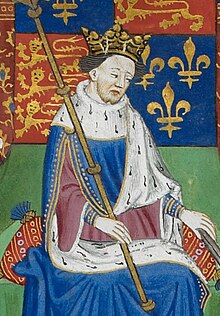
Back Hendrik VI van Engeland Afrikaans Henrique VI d'Anglaterra AN Heanric VI Engla Cyning ANG هنري السادس ملك إنجلترا Arabic هنرى الساتت ملك انجلترا ARZ VI Henri Azerbaijani Генрых VI (кароль Англіі) Byelorussian Хенри VI Bulgarian Herri VI (Bro-Saoz) Breton Henrik VI, kralj Engleske BS
This article needs additional citations for verification. (October 2021) |
| Henry VI | |
|---|---|
 Miniature in the Talbot Shrewsbury Book, 1444–1445 | |
| King of England | |
| 1st reign | 1 September 1422 – 4 March 1461 |
| 2nd reign | 3 October 1470 – 11 April 1471 |
| Coronation | 6 November 1429 Westminster Abbey |
| Predecessor | Henry V |
| Successor | Edward IV |
| Regent | See list
|
| King of France | |
| Reign | 21 October 1422 – 19 October 1453 |
| Coronation | 16 December 1431 Notre-Dame de Paris |
| Predecessor | Charles VI |
| Successor | Charles VII |
| Regent |
|
| Born | 6 December 1421 Windsor Castle, Berkshire, England |
| Died | 21 May 1471 (aged 49) Tower of London, London, England |
| Burial | 1471 |
| Spouse | |
| Issue | Edward of Westminster, Prince of Wales |
| House | Lancaster |
| Father | Henry V of England |
| Mother | Catherine of Valois |
| Signature |  |
| English Royalty |
| Second House of Lancaster |
|---|
| John, Duke of Lancaster |
| Henry IV |
| Henry V |
| Henry VI |
Henry VI (6 December 1421 – 21 May 1471) was King of England from 1422 to 1461 and again from 1470 to 1471,[1] and disputed King of France from 1422 to 1453. The only child of Henry V, he succeeded to the English throne upon his father's death, at the age of nine months; and succeeded to the French throne on the death of his maternal grandfather, Charles VI, shortly afterwards.
Henry was born during the Hundred Years' War (1337–1453), at the beginning of its third phase, in which his uncle, Charles VII, contested the Lancastrian claim to the French throne, which had been ratified in the Treaty of Troyes (1420). He is the only English monarch to have been crowned King of France, with his coronation in 1431 taking place in Notre-Dame de Paris. His early reign, when England was ruled by a regency government, saw the pinnacle of English power in France. However, subsequent military, diplomatic and economic problems damaged the English cause by the time Henry was declared mature enough to rule in 1437. The young king faced military setbacks in France, and political and financial crises in England, where divisions among the nobility in his government began to widen.
In contrast to his father, Henry VI is described as timid, shy, passive, benevolent and averse to warfare and violence; after 1453, he became mentally unstable. His ineffective reign saw the near total loss of English lands in France. In 1445 - partially in the hope of achieving peace - Henry married Charles VII's niece, the ambitious and strong-willed Margaret of Anjou. The peace policy failed and war recommenced, with France rapidly recovering much of the territory held by the English, including their ancestral lands in Aquitaine and the conquered Normandy. By 1453, Calais was the only English-governed territory on the continent. Henry's domestic popularity declined in the 1440s, partly due to the revelation that a large, strategically important territory (the county of Maine) had been secretly returned to the French. Political unrest in England grew rapidly as a result; the lynching of Henry's key adviser, William de la Pole, 1st Duke of Suffolk, provoked a major rebellion in 1450. Factions and favourites encouraged the rise of further disorder in the country: regional magnates maintained increasing numbers of private armed retainers, including soldiers returning from France, with whom they fought regional conflicts (e.g. the Percy-Neville feud), terrorised their neighbours, paralysed the courts, and dominated the government.[2]
Starting in 1453, Henry had a series of mental breakdowns, making him unable to rule; power was duly exercised by quarrelsome nobles, headed by the leaders of cadet branches of the royal family: Richard, 3rd Duke of York and Edmund Beaufort, 2nd Duke of Somerset developed a fierce political rivalry and jostled for power in Henry's government. Queen Margaret did not remain politically neutral and took advantage of the situation to make herself an effective power behind the throne. Amid military disasters in France, and a collapse of law and order in England, the Queen and her clique came under accusations - particularly from Henry VI's increasingly popular cousin, the Duke of York - of misconduct of the war in France and misrule of England. Tensions mounted between Margaret and York over control of the incapacitated King's government, which developed into a major dispute over the succession to the English throne. Civil war broke out in 1455, leading to a long period of dynastic conflict now known as the Wars of the Roses (1455-1487).
Henry was deposed on 4 March 1461 by York's eldest son, who took the throne as King Edward IV. Despite Margaret continuing to lead a resistance to Edward, Henry was captured by Edward's forces in 1465 and imprisoned in the Tower of London. Henry was restored to the throne by the Earl of Warwick in 1470; Edward retook power in 1471 and killed Henry's only son, Edward of Westminster, at the Battle of Tewkesbury; Henry was imprisoned once again. Having "lost his wits, his two kingdoms and his only son",[3] Henry died in the Tower during the night of 21 May 1471, possibly killed on the orders of King Edward. He was buried at Chertsey Abbey before being moved to Windsor Castle in 1484. Miracles were attributed to Henry after his death and he was informally regarded as a saint and martyr until the 16th century. He left a legacy of educational institutions, having founded Eton College, King's College, Cambridge and (together with Henry Chichele) All Souls College, Oxford. Shakespeare wrote a trilogy of plays about his life, depicting him as weak-willed and easily influenced by his wife, Margaret.
- ^ Britannica 1999.
- ^ Cram, Paul (1948). "Western Europe". In William L. Langer (ed.). Encyclopedia of World History (revised ed.). Cambridge: Riverside Press. p. 270.
- ^ Cheetham 2000, p. 44.
© MMXXIII Rich X Search. We shall prevail. All rights reserved. Rich X Search